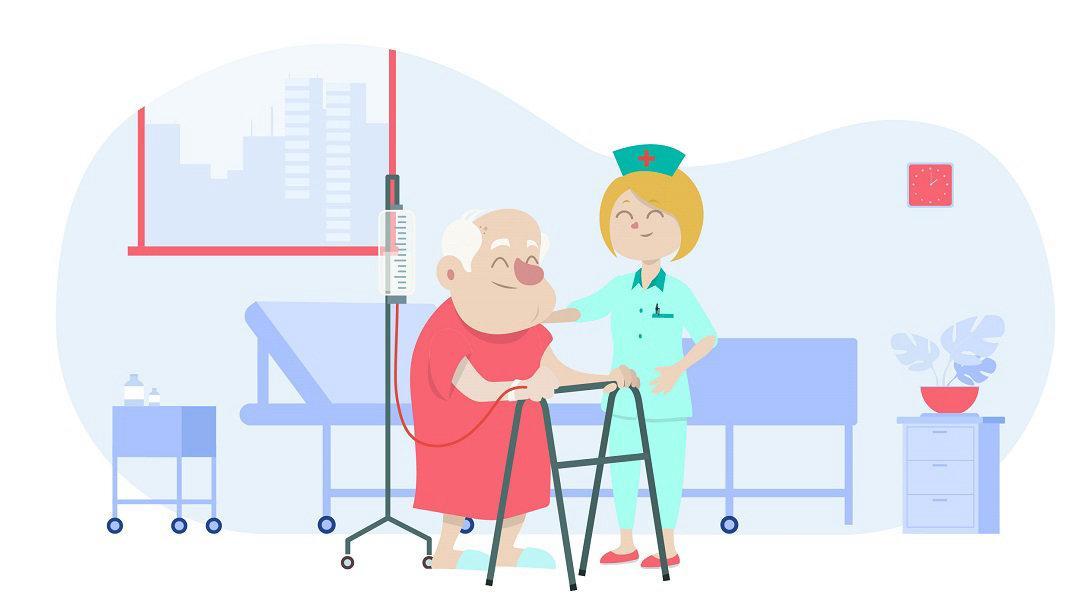Introduction
Home Health Care is an essential aspect of patient recovery. Without it, a patient may not heal or rehabilitate fully. Doctors may often recommend Home Health Care for a discharged patient. But, Home Health Care is different from just regular Home Care. As a patient or a loved one of a patient who needs to undergo this type of treatment, it is vital to understand what it entails.
Home Care offers the patient overall support for their daily physical and emotional needs. The nursing support schedules appointments, dresses and grooms the patient, and prepares the patient’s meals every day. The nursing support aid may act as a live-in caregiver or may only support the patient on an hourly basis.
Often, there’s confusion between understanding what Home Care and Home Health Care is.
For this reason, we’ve compiled some valuable information to ensure that you have a clear understanding thereof. Arming yourself with the knowledge will help you make an informed decision.
If you want more insights about Home Care, check out more details about this senior living option here.
What Is Home Care?
When your doctor suggests that you take on Home Care support or assistance, what does it mean? It is essential to understand that Home Care is very different from Home Health Care Services. How so? Home Care does not involve medical support.
Home Care is non-medical. In more specific terms, as a patient, you will receive a wide range of support for your daily activities including:
- Transportation to appointments
- Preparation of daily meals
- Monthly grocery shopping
- Regular wellness checks
- Companionship and socialization
A nursing aid will be your arms, legs, and eyes. It’s a superb way to navigate your way around life as a senior because you’ll have the support you need to manage your daily tasks. A professional support worker will assist you with the everyday activities you found easy to do before your illness or injury. Making a cup of tea or rearranging your appointments, such as your regular doctor’s consultations, will be managed and noted by your nursing aid. Your nursing aid will also assist you with dressing, grooming, bathing, and using the toilet.
A nursing aid or Home Care professional will visit you on an hourly or daily basis, or you may prefer to have a live-in nursing aid or personal support worker—of course, this will depend on your unique needs.

Home health care for elderly
What Is Home Health Care?
If you seek Home Health Care Services, note that this type of treatment has a specific time frame set by medical professionals like physical and occupational therapists, speech therapists, and on-home care medical professionals. Patients who have had major surgery or illness or another serious medical issue receive this type of care.
There are well-equipped rehabilitation centers that have skilled medical professionals to administer this type of treatment, but it could be done at home just like regular Home Care.
As a patient, you’ll most often receive a referral from your doctor to have this treatment. Patients who are in the hospital can receive home health services too. In this case, the patient will stay in the hospital for some time and receive rehabilitation to safely and efficiently transition into home life. The patient may need to adapt to many changes. Home Health Care services give the patient the tools and necessary treatment to navigate themselves when they enter the world outside their hospital beds.
A Home Health Care professional may do the following:
- Monitor the patient’s vital signs
- Educate the patient about their condition
- Change the patient’s dressings
- Evaluate the patient’s progress
- Assist the patient with rehabilitation exercises
- Administer the patients medication
Medical professionals may also assist with daily activities and needs such as dressing and grooming.
Does Medicare Pay for Home Health Care?
Yes, Medicare will pay for certain Home Health Care Services if the applicant meets specific eligibility requirements. It is also important to note that these services will be paid by Medicare only if the treatment is essential for the patient’s total rehabilitation.
What Is the Difference between Home Care and Home Health Care?
Home Care offers practical, non-surgical care that includes meal preparation and everyday social skills support and companionship. On the other hand, Home Health Care includes medical supervision and physical therapy, generally classified as clinical.
Initially, it may not be clear to see the core differences between Home Care and Home Health Care. But if you take a closer look, you’ll understand the following:
Home Care
- Can be administered hourly, daily, or have a live-in option
- Supports a patient’s daily needs
- Mainly done at the patient’s home
- Primarily supports the patient’s daily activities such as dressing and grocery shopping
- Requires the expertise of a Nursing aid or professional live-in Nurse
Types of Homes Care Services
- Personal care and companionship services
- Private duty nursing care
- Home health care
Home Health Care Services
- Has a specific treatment period
- May support the patient’s daily needs but primarily assists with their physical rehabilitation
- Can be administered at a rehabilitation center or at home
- Primarily supports the patient’s medical needs
- Physical or occupational therapists required for this service
Types of Home Health Care Services
- Skilled nursing
- Doctor visits
- Therapy services
- Nutrition counseling
- Home health aide services
- Medical supplies & equipment
What is hospice home health care?
Hospice home health care is a specialized type of healthcare for individuals with life-limiting illnesses. It focuses on providing comfort and support, improving quality of life rather than seeking a cure. This care is provided in the patient’s home by a team of professionals, including doctors, nurses, social workers, and chaplains.
Key features include:
- Palliative care: Pain and symptom management to ensure comfort.
- Emotional and spiritual support: Addressing the needs of both the patient and their family.
- 24/7 access: Care and support are available around the clock.
- Family support: Counseling and respite care for family members.
- Personalized care plans: Tailored to the individual’s needs and wishes.
Benefits include:
- Improved quality of life: Focusing on comfort and symptom management.
- Family support: Providing resources and assistance to ease the burden of caregiving.
- Peace of mind: Offering a sense of peace and dignity during the end-of-life journey.
Real-Life impact of home care and home health care
Here are some real-life examples and testimonials that illustrate the importance and effectiveness of home care and home health care:
Real-life examples
#1 Sarah’s journey
Background: Sarah is a 75-year-old woman living alone after the loss of her husband. She has a history of heart problems and struggles with daily activities.
Home Care Experience: After hiring a home care aide, Sarah experienced significant improvements in her quality of life. The aide helped her with daily tasks, including cooking and cleaning. More importantly, they provided companionship, which alleviated her feelings of loneliness. Sarah now looks forward to their daily chats and even enjoys cooking together.
#2 John’s Recovery
Background: John is a 60-year-old who recently underwent knee surgery. He is determined to regain his mobility but has limited family support.
Home Health Care Impact: With the assistance of a home health care nurse, John received physical therapy sessions at home. The nurse also monitored his recovery progress and managed his pain medication. Within weeks, John was able to walk with minimal assistance and felt empowered by the personalized care he received.
#3 The Ramirez Family
Background: The Ramirez family cares for their grandfather, who has Alzheimer’s disease and requires constant supervision.
Home Care Solution: They arranged for a skilled caregiver to visit during the day. This allowed the family members to work without worrying about their grandfather’s safety. The caregiver engaged him in memory games and activities, helping to slow down his cognitive decline while also providing much-needed respite for the family.
Testimonials
Testimonial 1: Linda C.
“I can’t express how much my mother benefited from home care. Our caregiver not only helped her with her medications but also engaged her in activities she enjoyed. It gave me peace of mind knowing my mom was safe and happy at home.”
Testimonial 2: Mark T.
“After my father’s stroke, we didn’t know what to do. A home health care professional came to our rescue, providing him with the therapy he needed right in his own living room. Seeing him regain his strength was incredible, and I truly believe that being at home made all the difference in his recovery.”
What Would be Your Best Option?
It is essential to have a frank discussion with your doctor. Make a list of your medical needs and what the treatment offers, and how they can accommodate your needs.
Ask yourself a few pertinent questions such as:
- Am I limited physically?
- How can I be best supported?
- What are my daily needs?
- Am I able to function optimally without additional support?
Once you’ve gained clarity, you’ll have all the information you need to proceed in the best way possible.
Get the lowdown on the pros and cons of Assisted Living and Home Care.
Top 3 Points
1. Home Care offers the patient overall support for their daily physical and emotional needs, including Activities of Daily Living, at the comforts of their home.
2. Home Health Care includes medical supervision and physical therapy, generally classified as clinical.
3. Patients who prefer to continue their recovery and rehabilitation at their own home is usually prescribed with Home Health Care Services.
Conclusion
Recovering from an illness or injury can be challenging, and home health care is there to help those patients. Home health care is provided by nurses, and therapists who provide care at home. Home health care differs from home care in that home health care is more intensive and may include medical treatments and services. Home care is provided by a personal caregiver who helps with activities of daily living, such as bathing, dressing, and grooming.
Always remember to stay positive and determined. Embrace the knowledge and expertise that our specialists have. Isn’t it wonderful to know that despite the challenges, there’s a way to flourish again?
Frequently Asked Questions
What home health care is covered by Medicare?
Medicare typically covers the home health care services that are medically necessary. For example:
– Nursing services
– Physical therapy
– Occupational therapy
– Speech therapy
– Medical supplies
– Home health aides
How long will Medicare pay for home health care?
Medicare pays your home health agency for the covered services you receive during a 30-day period of care. You can have more than one such period, and each is based on your health condition and care needs.
How to qualify for home health care?
In order to qualify for home health care, you must meet the following requirements:
- You must be homebound, meaning that you are unable to leave your home without assistance and your doctor must certify that.
- You must require skilled nursing care or therapy and the home health agency caring for you must be Medicare approved.
- You must be under the care of a doctor who is responsible for creating and reviewing a care plan for you.
Is home health care tax deductible?
Only medical services provided by home health care provider can be tax deductible under these three conditions:
- The care receiver must be chronically ill.
- A licensed health care professional must prescribe the care needs.
- The care must be of a type that the IRS has approved to be tax deductible.
Does Tricare cover home health care?
Yes, Tricare covers home health care for medically necessary services.

